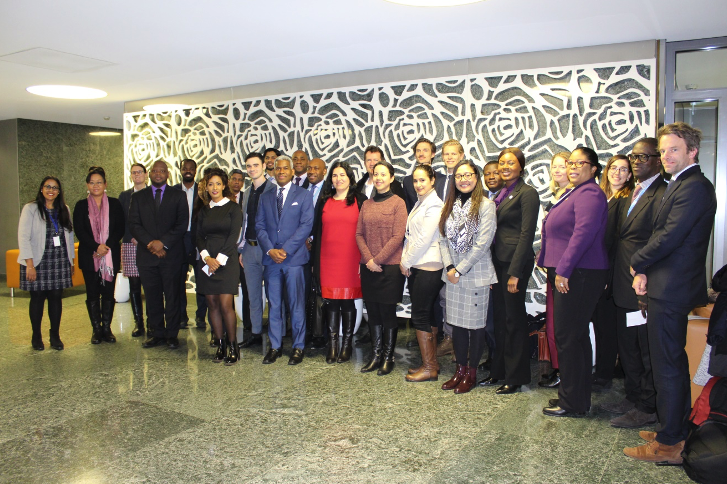Commonwealth
The 2013 Charter of the Commonwealth of Nations underscores the importance of protecting and promoting human rights as key foundations to build peaceful, just and stable societies in the Commonwealth. The Commonwealth’s goals are also CTI’s goals, and that is why we have partnered with the Commonwealth Secretariat in a wide range of activities.
Of the 54 countries who are members of the Commonwealth across all regions, approximately 72 per cent are parties to the UN Convention against Torture and are working to implement it. However, not all Commonwealth countries are yet on board. Whether parties or not, Commonwealth countries are united in their shared values of democracy, good governance and rule of law, independent judicial institutions and human rights, as expressed in the 1971 Declaration of Commonwealth Principles, which were further reiterated in the 1991 Harare Declaration. These principles are equally relevant to building societies free from fear and where people live in security and justice.
Notably, among the CTI Core States are two Commonwealth members, namely Fiji and Ghana. Along with other Commonwealth countries in CTI’s Group of Friends, they generously share their country’s experiences in ratifying, implementing and reporting under UNCAT. Support is available to Commonwealth governments in overcoming challenges and implementing concrete action and projects.
CTI’s focus in the Commonwealth is on:
- Full ratification of UNCAT being pursued through bilateral engagement, country or study visits and technical assistance;
- Supporting UNCAT-compliant legislative reviews and reforms;
- Partnering to recommend and overcome reporting challenges; and
- Professionalising policing systems.
Regional Ratification across Commonwealth
As Commonwealth States, we share the goals of the Commonwealth Charter, of building strong and stable countries built on democracy, good governance, human rights and the rule of law. The UN Convention against Torture is one of the key international human rights treaties that fosters fair systems for the administration of justice, that reduces some of the worst excesses by government officials, sustains development and supports strong economies.
Hon. Otiko Afisa Djaba, Minister of Gender, Children and Social Protection of Ghana.

CTI Engagement across the Commonwealth
The Commonwealth Heads of Government (CHOGM) meetings and other regional exchanges provide opportunities for Commonwealth States that share legal cultures and traditions to explore how the UN Convention against Torture can underpin their systems for the administration of justice and based on the rule of law and human rights.
CTI has undertaken a number of productive bilateral and high level visits to Commonwealth countries, promoting the UN Convention against Torture and working with national authorities to prepare a roadmap for implementation.
In Africa, CTI closely supported The Gambia’s path to UNCAT ratification, conducting a diplomatic delegation visit in February 2018 and a post-ratification technical seminars in October 2018 and October 2022 to support the country’s UNCAT implementation efforts.
In Asia, CTI invited a delegation from Malaysia to a study visit to Geneva in 2016 to introduce them to the benefits and obligations of UNCAT and explore efforts and opportunities towards UNCAT ratification. In July 2019, CTI participated in a seminar organised by Malaysia’s National Human Rights Commission (SUHAKAM) on UNCAT accession, held in Kuala Lumpur, Malaysia, where CTI also held positive meetings with representatives from various government departments.
In the Caribbean, CTI has closely worked with the Governments of The Bahamas and Grenada through diplomatic delegation visits (Bahamas visit (2017), Grenada visit (2016) and Grenada study visit (2016)) and regional seminars to offer technical assistance and sharing of experiences to support their respective pathways to UNCAT ratification and implementation. Both countries have become State parties to UNCAT. Visits have also been conducted to Saint Lucia (2016) and Dominica (2019).
In the Pacific, CTI has conducted diplomatic delegation visits to Samoa (2017) and Tonga (2019) to explore opportunities presented by UNCAT and to raise awareness on the benefits the treaty could bring to improve domestic practices. Samoa acceded to UNCAT in April 2019.
Developing anti-torture legal frameworks
UNCAT requires States parties to adopt specific legislative provisions to prevent and respond to torture and ill-treatment, in which the criminalisation of torture in national legislation is one of the primary elements. Most Commonwealth countries share common law legal systems, which, as opposed to civil law ones, rely on the concept of legal precedent as established by courts (case law), inherited from the English legal system. In this light, CTI has provided specialised technical assistance to Commonwealth members as they conduct legislative reviews to harmonise their national laws in line with their obligations under UNCAT, both in preparation for and after ratification.
Partnering to recommend and overcome reporting challenges
The majority of the remaining Commonwealth members that are yet to become party to UNCAT are Small Island Developing States (SIDS) or Least Developed Countries (LDCs). While most have no particular political or legal obstacles to ratifying UNCAT, common challenges, however, often prevent them from considering ratifying or acceding to additional human rights treaties. Such reasons include limited capacity, coordination mechanisms and resources to report to the UN human rights treaty bodies. For this reason, and with the aim of contributing to the 2020 review of the Treaty Body system, CTI partnered with the Commonwealth and the Universal Rights Group and convened a closed door discussion to hear from SIDS and LDCs on ways to improve access and simplify their reporting burden to the UN human rights treaty bodies, recommendations from which were submitted to the treaty body review process.
Some persons may well ask why a small country would take on the additional burden of such a UN Convention, with all the international scrutiny and oversight that would necessarily be involved. The short answer is to help to make a Better Bahamas [-].
The Hon. Ellsworth Johnson, former Minister of State for Legal Affairs of The Bahamas, during his opening address at CTI’s regional seminar in Saint Lucia, held on 4-6 June 2018.

Professionalising policing systems
Several Commonwealth countries have embarked on domestic efforts to professionalise their police services by ensuring that adequate professional standards are reflected in laws and policies, that on-the-job training is robust and modern, and that independent accountability mechanisms are in place to investigate complaints and build trust with civilian stakeholders. Among other topics, these efforts have focused on regulating the use of force and firearms in law enforcement, implementing non-coercive interviewing methods, and providing training and capacity-building on human rights and torture prevention.
For an overview and introduction to interviewing for criminal investigations, read CTI’s Training Tool on Investigative Interviewing for Criminal Cases, available in 10 languages here.

